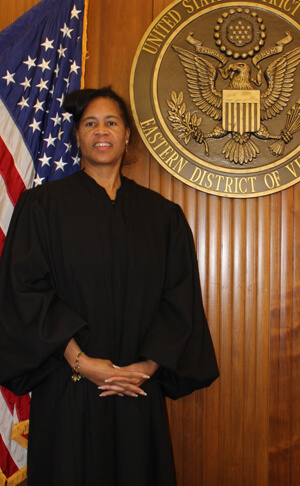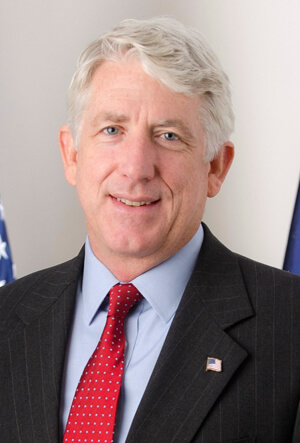Sally and Susan Waters, with Kayla, for whom they are legal guardians, and their daughters, Ella and Jaden. | COURTESY: JASON McCLAREN
Finding that Nebraska’s constitutional amendment banning same-sex marriage violates the 14th Amendment’s Equal Protection Clause, a federal district court has granted a motion by seven same-sex couples for a preliminary injunction against its enforcement. Senior District Judge Joseph F. Bataillon, ruling on March 2, denied the state’s request to stay his order pending appeal, but agreed to delay its effective date until March 9 to give the state a chance to ask the Eighth Circuit Court of Appeals for such a stay.
Nebraska Attorney General Doug Peterson, a Republican, quickly filed a notice of appeal, indicating the state would ask the circuit court to issue that stay. Peterson may well find a receptive venue in the Eighth Circuit, which has already scheduled arguments in appeals of marriage equality rulings from South Dakota, Missouri, and Arkansas for May. In each of those cases, the district courts issued the stays, and the circuit recently rejected a request by counsel for the Missouri plaintiffs to lift the stay there.
What could persuade the Eighth Circuit to reject the emergency request from Nebraska’s attorney general, however, is the Supreme Court’s recent action denying a stay of the marriage equality ruling in Alabama. Dissenting from the Supreme Court’s refusal to intervene, Justice Clarence Thomas, joined by Antonin Scalia, accused the high court of improperly sending a signal about how a majority planned to deal with the marriage issue when it rules in June. Judge Bataillon took specific note of that dissent in explaining his decision not to delay his ruling past March 9.
Some recent marriage equality rulings have been grounded in the fundamental right to marry protected by the Due Process Clause. Others have based their holding on the Equal Protection Clause, finding that the exclusion of same-sex couples is a form of unjustified discrimination, either based on sexual orientation, sex, or both. Bataillon, a former public defender appointed to the bench by President Bill Clinton in 1997, preferred the equal protection route, although his opinion also discussed the due process argument.
Because he was deciding a motion for a preliminary injunction rather than issuing a final ruling on the merits, the judge’s discussion of the constitutional issues was focused on predicting what an eventual ruling on the merits might be. The plaintiffs’ burden was to persuade him they are likely to prevail, and a simple counting of decisions by other courts pro or con would easily suffice to meet the burden.
Bataillon pointed out that the Supreme Court in its 2013 Defense of Marriage Act ruling and subsequent decisions from four US circuit courts of appeals and the overwhelming majority of dozens of federal district court taking up the marriage question have all rejected the justifications states have advanced for refusing to allow same-sex couples to marry. He also easily concluded that the harms to the plaintiffs from not granting them relief outweighed any harm to the state from ordering it to stop enforcing its ban.
Bataillon drew heavily on Judge Richard Posner’s powerful opinion for the Seventh Circuit Court of Appeals in the Indiana and Wisconsin marriage cases, which focused particularly on the harms to children imposed by denying same-sex couples the right to marry. Posner, he wrote, “rejected the rationale that same-sex couples and their children do not need marriage because same-sex couples cannot produce children, whether intended or unintended, as an argument ‘so full of holes that it cannot be taken seriously.’”
Bataillon also embraced the view, adopted by a minority of the district court judges and by one concurring judge in the Ninth Circuit’s ruling, that the ban on same-sex marriage is a form of sex discrimination and so should be subjected to heightened judicial scrutiny –– a perspective that makes it unnecessary to decide whether sexual orientation discrimination claims also deserve heightened scrutiny.
Looking to the federal district court ruling in the Michigan marriage case, Bataillon easily dispatched Nebraska’s reliance on several widely discredited “studies,” including two articles published by University of Texas professor Mark Regnerus, disparaging the parenting skills of same-sex couples. The federal court in Michigan found them to be “unbelievable and not worthy of consideration,” characterizing them as a “fringe viewpoint that is rejected by the vast majority of [the studies’ authors’] colleagues across a variety of social science fields.”
Bataillon offered a vigorous conclusion to his opinion, writing, “The State primarily offers as its rational basis for this gender-specific discrimination the encouragement of biological family units. The essence of this rationale has been rejected by most courts and by no less than the Supreme Court. With the advent of modern science and modern adoption laws, same-sex couples can and do responsibly raise children. Unfortunately, this law inhibits their commendable efforts.”
The plaintiffs are represented by the American Civil Liberties Union of Nebraska Foundation and the ACLU’s LGBT Project, with Omaha attorneys Susan Koenig and Angela Dunn as local counsel.



































